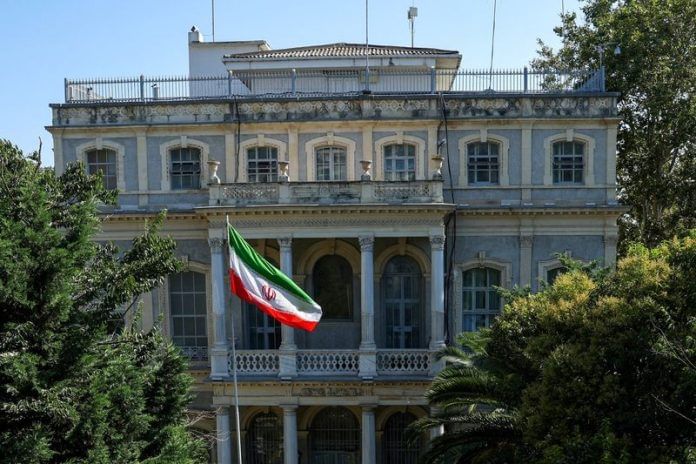By John Irish and Parisa Hafezi
UNITED NATIONS (Reuters) -Iran and European powers have agreed to continue talks about Tehran’s disputed nuclear programme, Iranian foreign ministry said on Tuesday, after a meeting to try to strike a last-ditch deal to avert the reimposition of U.N. sanctions.
The foreign ministers of France, Britain and Germany – the so-called E3 – along with the EU’s foreign policy chief held talks with their Iranian counterpart on the sidelines of the U.N. General Assembly.
“In light of the unjustified and illegal move to begin reinstating the U.N. Security Council’s sanctions, some ideas and proposals for continuing diplomacy were raised during the meeting, and it was agreed that consultations will continue,” Iran’s foreign ministry said in a statement.
After the meeting, a French diplomatic source said the discussion will continue to “explore all possibilities to the fullest”, adding that Iran has yet to meet the conditions set by the E3 to avert the revival of U.N. sanctions.
On August 28, the E3 launched a 30-day process to reimpose U.N. sanctions, which ends on September 27, accusing Tehran of failing to abide by a 2015 deal with world powers aimed at preventing it from developing a nuclear weapon.
Tehran has long said its nuclear programme is for peaceful purposes.
PROCESS TO REIMPOSE SANCTIONS
The European powers have offered to delay reinstating sanctions for up to six months to allow space for talks on a long-term deal if Iran restores access for U.N. nuclear inspectors, addresses concerns about its stock of enriched uranium, and engages in talks with the United States.
Speaking to Reuters in New York, U.N. nuclear watchdog chief Rafael Grossi said on Tuesday there were “intense” conversations between him, Iran, European powers and the United States to find a solution, adding that a team of inspectors was on its way to Iran should Tehran and European powers reach a deal this week.
Ahead of the meeting between Iran and the E3, German Foreign Minister Johann Wadephul said that “it must be clear to everyone that, after all of Iran’s delaying tactics, the possibilities and chances of reaching a diplomatic solution before sanctions are triggered are extremely slim”.
Iranian and European officials said on Monday that the prospects for a deal were not high, with Iranian Foreign Minister Abbas Araqchi calling on the E3 to choose “cooperation or confrontation”.
Ali Larijani, a senior adviser to Iran’s supreme leader, criticised the West for “making empty promises”, Iranian state media reported on Tuesday, saying the Islamic Republic would only accept a “reasonable and fair proposal that guarantees Iran’s interests”.
TRUMP SAYS POSITION IS SIMPLE
U.S. President Donald Trump said during his address to the U.N. General Assembly on Tuesday that Iran could never be allowed to possess nuclear weapons.
“My position is very simple: The world’s number one sponsor of terror cannot be allowed to possess the most dangerous weapon,” Trump said.
A few hours later, Iran’s Supreme Leader Ayatollah Ali Khamenei said in a recorded message “we do not need nuclear weapons, and do not intend to produce one”.
Khamenei flatly rejected any negotiations with the United States over its nuclear work, and said “negotiations with the United States would not serve Tehran’s interests and would prove a dead-end”.
(Additional reporting by Elwely Elwelly in Dubai; Reporting and writing by John Irish and Parisa Hafezi; Editing by Alison Williams and Daniel Wallis)
Disclaimer: This report is auto generated from the Reuters news service. ThePrint holds no responsibility for its content.





